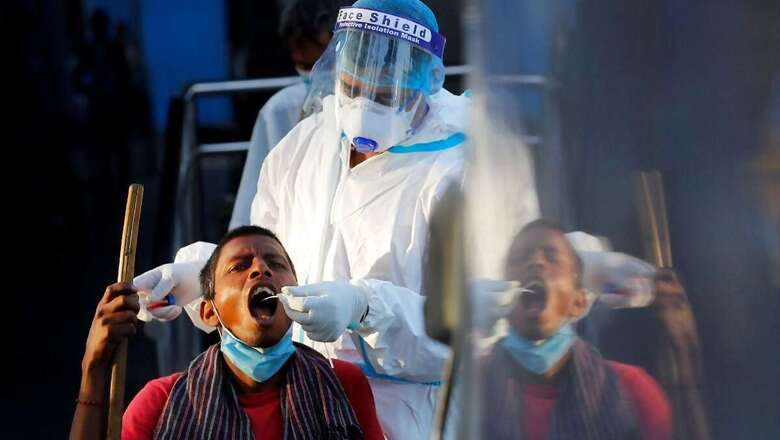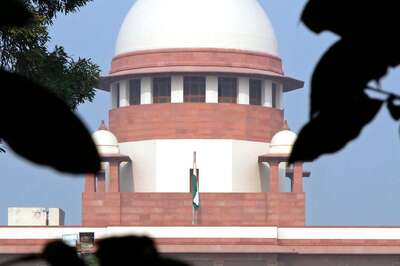
views
The night curfew is back in several cities, and weekends are now, preferably, spent at home. As the COVID-19 numbers go up at an alarming pace in the second wave of the pandemic, we must look for solutions, some from last year and some new ones that address recent concerns.
This phase is increasingly getting characterized by a larger number of younger people contracting the infection and a significant increase in cases in rural India. The virus itself seems to have mutated and there are various estimates on the number of mutant varieties on the prowl. The World Health Organization (WHO) has urged all countries to increase the sequencing of the COVID-19 virus and share information with the rest, so that the picture gets clearer on how the virus is mutating.
The Indian government, particularly the ministries of health and finance, was well prepared for this calamity and, in a lot of ways, was getting ready to tackle the new set of problems expected during a second wave. The five-fold strategy announced by the Prime Minister himself comprises testing, tracing, treatment, COVID-appropriate behaviour and vaccination. This week, however, the number of COVID-19 cases crossed 1 lakh a day-mark for the first time; and we must now get worried. Not only do we have more daily cases than ever, but we also find the virus moving to states that were spared last year during the first wave. The increase in cases in Uttar Pradesh and Chhattisgarh is ominous, and if this trend continues, we have a battle on our hands in tackling the pandemic in areas that suffer from extremely poor health infrastructure.
Some health solutions at hand
As we rush to tackle this surge, we must go back to the basics. Hand washing, wearing masks, physical distancing, avoiding gatherings and closed spaces are simple behavioural patterns that need to be established and enforced. As the infection spreads, it is not just enough to issue advisories asking people to comply, it is imperative to make them mandatory and announce strict penalties.
Curfews at night and during weekends do not serve the purpose. They only give confusing signals. What is important is responsible behaviour on all days of the week. We have learnt a costly lesson last year—that shutting down businesses and closing public transport comes at a cost to the economy.
ALSO READ| Next Four Weeks Crucial in India’s COVID Fight. Country Must Act on These Five Points Now
What we, therefore, need are restrictions on the number of people in closed spaces, like cinema halls, restaurants and even airplanes. Like in France, what we now need is a regional approach where local health officials and elected representatives can decide how to control the spread in the neighbourhood. This avoids the one size fits all pitfall of a centralised strategy and allows several innovations driven by local conditions, healthcare infrastructure and demographics. Since the virus has been spreading differently in different parts of the country, empowering the local heath machinery has become essential.
Another cause for worry is the spread of the pandemic in two of our most populous states, Uttar Pradesh and Bihar. In the first phase, the prevalence was low and the fatality rates were negligible. However, the second wave seems to have hit these states badly and the numbers coming in are scary. Here, one could look at the United Kingdom for a possible solution which enforced strict localized lockdown in areas like central Manchester and South Yorkshire, asking all restaurants, pubs and hospitality venues to stay closed. In some places, residents were banned from meeting others indoors.
How to blunt the economic blow
The apprehension that the second wave will bring in further joblessness and wage cuts is not unfounded. The recent estimate that 32 million Indians have been pushed out of middle class now seems to be an understatement. The number of the very poor has grown by at least twice that estimate and therefore any kind of lockdown to counter the second wave is fraught with danger. But given the inevitability of some sectors again getting negatively impacted, there is a strong argument for a wage support programme, implemented in several countries last year.
The demand for Rs 6,000 a month job support to the most vulnerable population, estimated at 200 million, is not unreasonable and can be an effective solution to the problems the workforce will face when various kinds of lockdowns are imposed in different parts of the country. Denmark and the United Kingdom have experimented with a furlough scheme that allows employers to keep their employees on leave for long periods of time. Germany allowed employees to take on a second job to make up for earnings and wages lost during the pandemic. There has also been an emphasis on re-skilling of the workforce almost across Europe during the pandemic.
ALSO READ| Who Needs It vs Who Wants It: How India’s Vaccine Success Story Has Taken a Wrong Turn
At this hour, we need to open up vaccination for the masses. The 24-hour availability of vaccination facilities is a right step in this direction. We should quickly lift all age restrictions and allow everyone who comes forward to take the two doses of the vaccine. More vaccines should be released in the market and the ones that are stuck because of delays in granting approvals should be rolled out quickly. The corporate sector as well as the NGOs must be empowered to help the young and vulnerable population get vaccinated quickly.
It is also important to not lose sight of the requirements when the economy is starting to look up. Just when sales are increasing and tax collections improving, this second wave will hit consumption again. It is important to encourage consumers to spend, which will happen when incomes rise. Job creation will be crucial especially when unemployment is mounting. With inflation rearing its head again, it will be a reluctant customer who needs to be encouraged to buy more durables, food and consumables. States need to be compensated and paid their dues quickly so that they enable their markets to spur business activity.
Therefore, investment in infrastructure is key now. The government has already made major announcements on increasing infrastructure spend—a $500 billion dollar spending plan should boost consumer spending and create avenues for employment. Similarly, the spend on public infrastructure projects, notably roads and railways, will go a long way in revving up the economic engine. With a $30 billion dollar budget for healthcare infrastructure, there is certainly a push for prioritizing health even as India witnesses a second wave and looks for ways to control it.
Read all the Latest News, Breaking News and Coronavirus News here. Follow us on Facebook, Twitter and Telegram.




















Comments
0 comment